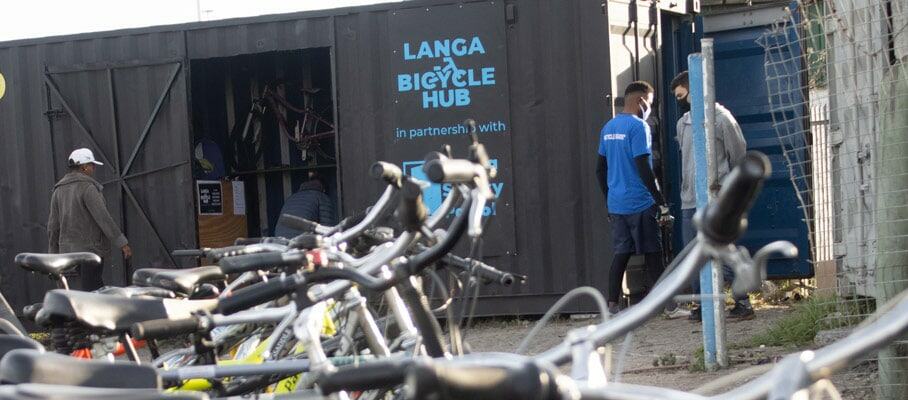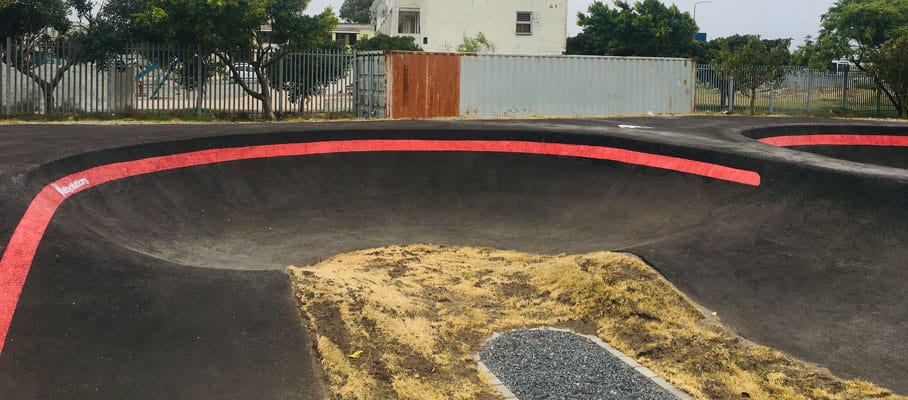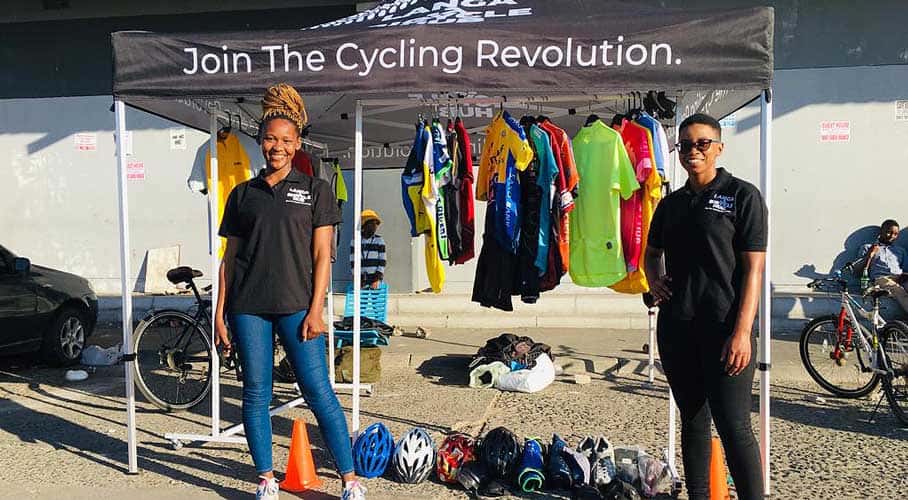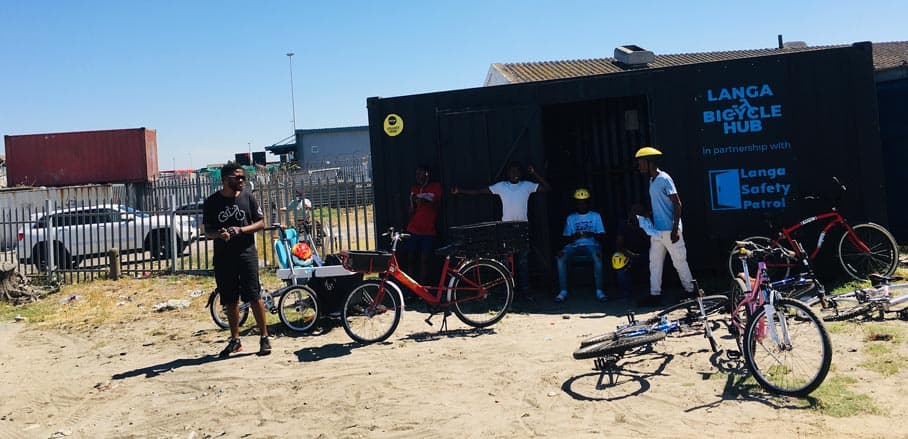Building A Home For Bicycles In Langa
The bicycle hub in Cape Town’s township of Langa started as a small community initiative that delivered medicine to bedridden people in the neighbourhood. Within just two years, it developed into a local enterprise that shapes mobility patterns in Langa. Founder Mzikhona Mgedle shares a story of success.
During the trying times of the early COVID-19 pandemic in 2020, I started the Langa bicycle hub from my second-floor flat in the Cape Town township of Langa. We had a very strict lockdown in South Africa, and initially, the hub was a community response delivering medicine by bicycle to bedridden people in the area. Today the hub is a local enterprise with two sites offering cycling classes, bicycle repairs, sales and rentals, bicycle tours, and much more. It is a place-making space for employment and mobility innovation that aims to spark a cycling revolution in Africa. How we got there speaks to how bicycles fit into the fabric of Cape Town life and how transport connects to, and impacts, not just mobility, but employment, safety, health, and many other things.

© Langa Bicycle Hub
The Power Of Bicycles
I first saw the power of bicycles and community mobilisation in Langa when, as part of Open Streets Cape Town, we brought Open Streets to Langa for the first time. The temporary creation of car-free streets, Open Streets made it easy for people to walk and cycle, especially the youth, and got a lot of buy-in from the community. Langa is a ‘township’ – one of the areas created historically in South Africa according to racial segregation. And these are still relatively poor and usually cut off – physically and economically – from the central areas of our cities.
During the first COVID lockdown in 2020, many people couldn’t get access to their medicines, and we saw an urgent need to change this. Medicine delivery by bicycle was the first activity of the hub, but what I really wanted was to have a home for the bicycle in Langa. I wanted to do something that would benefit the community. Through fundraising and some of my own income, the hub’s first home became a six-metre shipping container. The hub quickly attracted other team members and we started “learn to cycle” classes, repairing, and selling bicycles, and then expanded to approaching partners to collaborate.
Shifting Gears: Adopting To The Community’s Bicycle Needs
Over time this changed, as we learnt more about what the community’s needs really were. Many people don’t need repairs, they need parts, training, and accessories so that they can do it themselves. So, the first shift was from repairs to parts. The second one was from new-bike sales to second-hand sales as well as rentals and tours, as people don’t necessarily have the capital to buy expensive bicycles. We also offer second-hand bicycles to make sure that people are not blocked by price in order to ride. Sometimes we get these bicycles by approaching well-off suburban communities, going door to door, carrying a flyer offering to buy unused bicycles parked in garages. We also go online to look for second-hand bulk buying of bicycles on Facebook.
People in Langa need bikes to go from A to B, and many people actually prefer to rent bicycles for these trips. The hub, therefore, offers a range of things, including a bicycle workshop for repairs/sales, cycling awareness pop-up stores, our learn2cycle programme, and collaboration that offers road safety training for employees of Pathway Cycles. More broadly, we are advocating for bicycles to be an alternative transportation mode for township residents. We encourage others to join us to see more bicycles in Langa to promote non-motorised transport, contribute to the reduction of air pollution, and combat climate change. But we are also more than bicycles and training; we prepare and compile employment application documents for youth in Langa.
Building A New Culture From The Ground Up
We have initiated a mobility space, where people are enabled and encouraged to move around on bicycles, and where it is becoming the norm to see people on bicycles all over Langa. Children and adults are claiming the narrow roads with bicycles. We organise social bike rides and we’ve started a bike-to-school bike bus. And we organise routes where groups can cycle together from Langa to other parts of the city. We’re starting to see a real cycling culture developing. People are on bicycles, kids are on bicycles, organisations are on bicycles, even safety patrollers are on bicycles. We are often contacted for lessons and advice both from inside and outside of Langa.

© Langa Bicycle Hub
The model we used for bicycle delivery of medicine is being used in other townships such as Khayelitsha. We are becoming a bridge for others.
The hub is now expanding to a City of Cape Town facility, where Langa Bicycle hub has already placed a 12M container structure to be converted into a bicycle workshop to repair and sell bicycle equipment and parts and to run bicycle tours. We’ve managed to get another site in collaboration with other NGOs and the local government to keep building the project and develop activities together.
The Way Forward
But we’ve faced big challenges along the way. These speak to what is needed for greater impact – resourcing, building sustainable partnerships, and removing bureaucratic barriers to alternative transport and small businesses working in this space. First, communities like Langa and small enterprises like the hub lack access to resources, and this is a real struggle. Increased support from donors and government would go a long way to facilitating community-born and community-led initiatives to thrive. Second, it’s challenging to build sustainable partnerships when we often work in silos. Collaboration has huge potential, but it needs to be based on trust and respect and working across geography and sectors. The third, and one of the biggest challenges, is creating an environment with less red tape. Compliance is expensive. Often, regulations are set up in a way that does not work in reality for small businesses – both governmental and private-sector ones.
Local and municipal governments should work towards the removal of such barriers – environments that encourage innovation and experimentation by local communities are so important! It is community members who know best which problems exist and what are apt solutions to them, and they need to be able to experiment with the best ways to implement their ideas. If cities enable them to act and invent and explore as the community experts that they are, they will make a true contribution towards more liveable cities for all. There are grounded good practices experimenting with innovative change for mobility and non-motorised development which can be adapted around the world to help cities think differently about informal initiatives. Langa Bicycle Hub is one of the innovative good examples of change we need and of doing things.
Join the cycling revolution!

© Langa Bicycle Hub
- Building A Home For Bicycles In Langa - 26. April 2022
